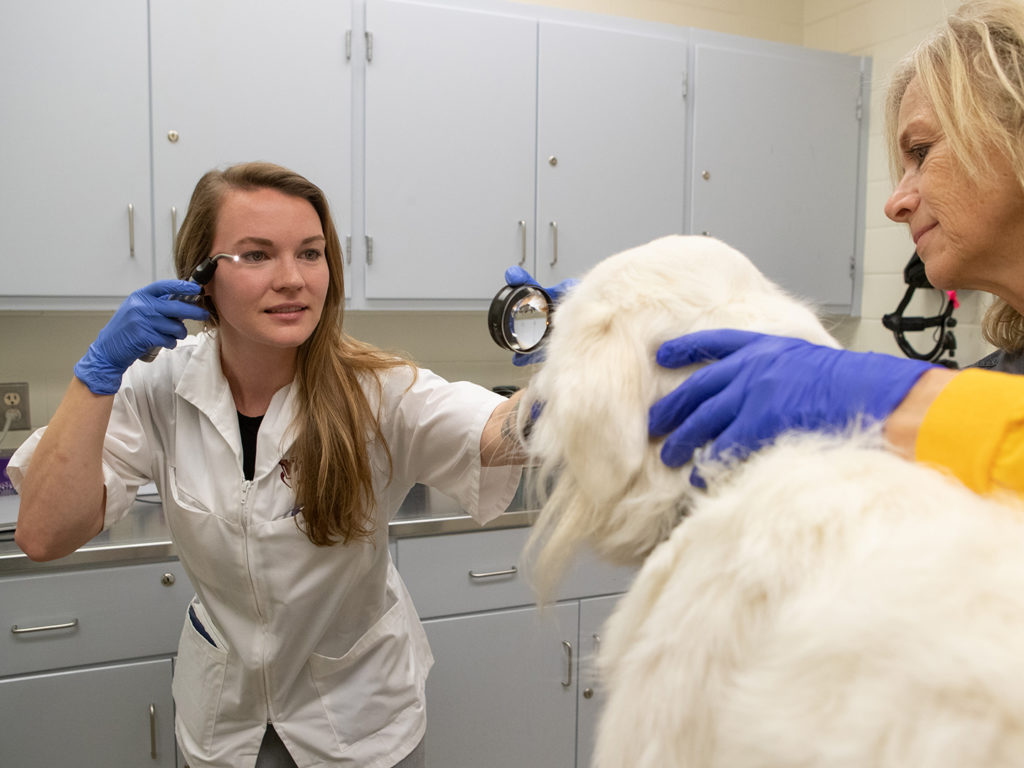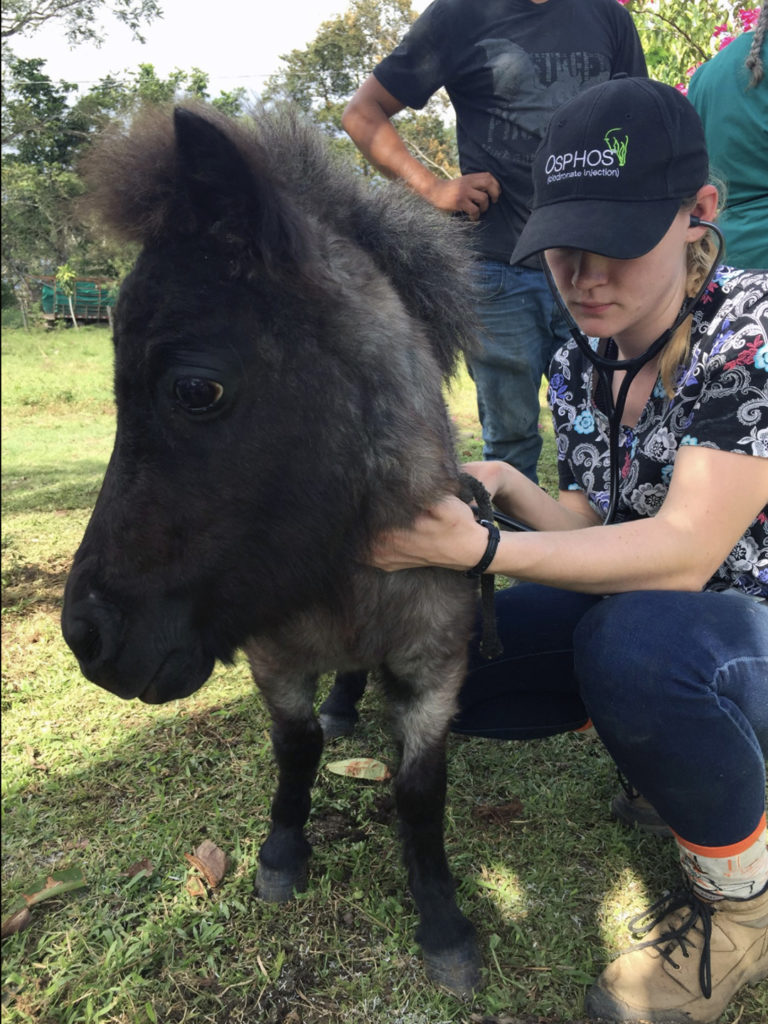VMBS Launches Underserved Communities Internship To Expand Access To Veterinary Medicine
Story by Megan Myers, VMBS Communications

One out of every four American households with pets experiences barriers to veterinary care, according to a report by the Access to Veterinary Care Coalition.
The Texas A&M College of Veterinary Medicine & Biomedical Sciences (VMBS) seeks to change that through a variety of outreach initiatives, including a new internship program focused on reaching underserved communities.
“Pet healthcare is expensive and we do very high-level stuff here, so we have been dreaming about how we can open the hospital doors more,” said Dr. Jon Levine, head of the Small Animal Clinical Sciences (VSCS) department. “Private industry is helping us by creating more pet health insurance, which is breaking down some of those barriers, but we want to do more. We want to keep looking for opportunities to be inclusive and impact the whole state.”
The Underserved Communities Internship was created to give recent veterinary graduates the opportunity to learn about diversity and inclusion in veterinary medicine while completing a 12-month rotating internship at the Texas A&M Small Animal Teaching Hospital (SATH).
Dr. Jendaya O’Grady, a 2021 graduate of the Virginia-Maryland College of Veterinary Medicine, joined the VMBS as its first Underserved Communities Intern, bringing with her a wealth of experience and a passion for serving others.
During her year in this position, O’Grady gained valuable skills and knowledge to support her future career, a part of which she hopes to dedicate to providing veterinary care to underserved individuals and communities.
Giving Back, Globally
Growing up in northern Virginia, O’Grady loved joining her father, an equine veterinarian and farrier, as he went on farm calls to treat horses.
Her relationship with her father also instilled a love for international travel and serving others, which prompted O’Grady to go on several veterinary mission trips around the world during her years as an undergraduate and veterinary student.
“I have traveled to the bottom of the Grand Canyon to work with the Havasupai American Indians and to Costa Rica’s Osa Peninsula to participate in educational workshops for veterinarians and equine owners,” she said. “I also did one project for about six weeks in Ho Chi Minh City, Vietnam, working in a human hospital to gain perspective about the different treatments, diseases, and resources in different regions.”
Despite being influenced by her father’s work with horses and her equine work abroad, O’Grady discovered a passion for small animal medicine and ophthalmology while in veterinary school.
Even as a student, she began dreaming of ways to combine her love for serving under-reached communities and her new passion for ophthalmology. When she heard about the new internship at Texas A&M, it was the perfect fit.

“Giving back to communities by providing services and education is something that I plan to pursue throughout my career, but I originally thought I was going to have to put those things on hold during an internship and residency,” she said. “When I saw this opportunity, I thought, ‘Wow, I can make a difference while I’m doing my internship and build those bridges between ophthalmology and giving back.’”
During her year at the SATH, O’Grady worked on a research project focused on finding new ways to bring the veterinary ophthalmology specialty to underserved communities in Texas and beyond.
“Many veterinarians and clients in underserved communities may not have access to specialties such as ophthalmology for a variety of reasons, location and finances being the most common,” she said. “Within the last few years, the literature from human healthcare describing the provision of eye care to underserved populations has grown, but the veterinary literature remains very limited. While it feels like we may be starting from just above ground zero, it also means there are many avenues to explore.”
During her internship, she analyzed the need for ophthalmic services and the challenges those living in Texas’ underserved communities currently face in receiving specialty care for their pets. Then, she explored a variety of potential options for addressing that need, including telemedicine, improved communication between general practitioners and specialists, and partnerships with shelters or clinics in need of minor ophthalmic surgeries.
“When I envision a fulfilling career, it includes giving back to the communities that nurtured my love of veterinary medicine, providing service to individuals who rely on animals for their livelihood, and teaching the next generation of students,” O’Grady said.
One For All, All For One
Creation of the Underserved Communities Internship first began in late 2019, when Levine and Dr. Kenita Rogers, former VMBS executive associate dean and director for Diversity & Inclusion, began brainstorming new ways to incorporate diversity, inclusion, and outreach at the SATH.
They approached VSCS faculty about creating an internship with an added emphasis on diversity and inclusion and were shocked and thrilled when more than a third of its faculty members volunteered to help.
The resulting working group—including Levine, Rogers, and McCool, as well as Drs. Nance Algert, Brad Bennett, Audrey Cook, Kate Creevy, Jackie Davidson, Ali Diesel, Lindsey Gilmour, Sharon Kerwin, Christine Rutter, Tracy Vemulapalli, and Emma Warry—developed the program with two overarching goals—to improve the SATH’s outreach to underserved communities and to promote diversity within veterinary medicine.
“Any time you bring in people who have a different perspective or life background than you, it makes you better. The more people we can bring in—especially those early in their careers like students, residents, and interns—the more really novel ideas we’re going to have,” Levine said. “We’re going to hear about things that we may not have heard about before. We’re going to be able to have some difficult conversations that are going to make us stronger.”
In the future, the SATH plans to host two Underserved Communities Interns each year and will continue to seek applicants with diverse backgrounds and experiences.
###
Note: This story originally appeared in the Summer 2022 edition of VMBS Today.
For more information about the Texas A&M College of Veterinary Medicine & Biomedical Sciences, please visit our website at vetmed.tamu.edu or join us on Facebook, Instagram, and Twitter.
Contact Information: Jennifer Gauntt, Director of VMBS Communications, Texas A&M College of Veterinary Medicine & Biomedical Sciences; jgauntt@cvm.tamu.edu; 979-862-4216


